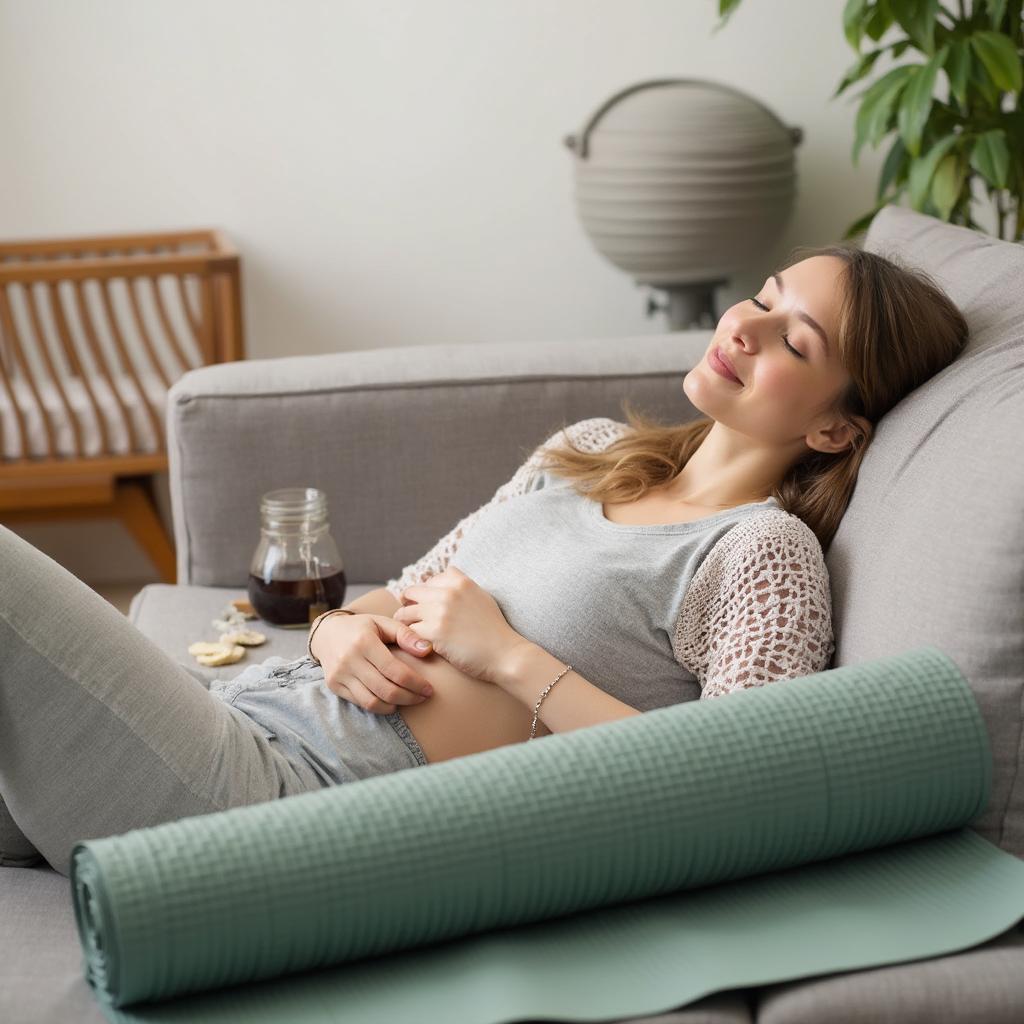Your cart is currently empty!

Postpartum Self Care Tips: Nurturing Yourself After Childbirth
Postpartum self care is crucial for new mothers. This period, often overlooked amidst the joys and challenges of newborn care, significantly impacts a woman’s physical and emotional well-being. Prioritizing self-care isn’t selfish; it’s essential for recovery and building a strong foundation for motherhood. This article will provide practical Postpartum Self Care Tips to help you navigate this transformative time.
Focusing on your well-being after delivery is essential for both physical and mental recovery. Many new mothers experience a range of emotions and physical changes, making self-care even more vital. Remember, taking care of yourself allows you to better care for your newborn. Simple acts of self-care can significantly impact your mood, energy levels, and overall well-being. self-care/ recovery tips after childbirth can help guide you through this journey.
Physical Postpartum Self Care Tips
Physical recovery after childbirth requires attention and care. Listen to your body and allow yourself ample time to heal.
- Rest when baby rests: Newborns sleep in short bursts, creating opportunities for you to nap. Resist the urge to catch up on chores and prioritize rest.
- Nourishing Nutrition: Focus on nutrient-rich foods to replenish your body. Include fruits, vegetables, whole grains, and lean protein in your diet. Hydration is also key, so drink plenty of water throughout the day.
- Gentle Movement: Start with light walks and gradually increase activity as your body allows. Consult with your healthcare provider before engaging in strenuous exercise.
- Perineal Care: Follow your doctor’s instructions for perineal care. Sitz baths and ice packs can provide relief and promote healing.
 Postpartum Physical Self-Care Essentials: Rest, Nutrition, and Gentle Movement
Postpartum Physical Self-Care Essentials: Rest, Nutrition, and Gentle Movement
Emotional Postpartum Self Care Tips
Emotional well-being is just as important as physical recovery. The postpartum period can bring a rollercoaster of emotions, from joy and excitement to anxiety and overwhelm.
- Accept Help: Don’t hesitate to accept help from family and friends. Whether it’s with meals, errands, or baby care, allowing others to support you can lighten your load.
- Connect with other moms: Sharing your experiences with other new mothers can create a sense of community and validation. Online forums, support groups, and mom-and-baby classes are great resources.
- Prioritize “Me Time”: Even short periods of time dedicated to activities you enjoy can make a big difference. Reading a book, taking a warm bath, or listening to music can help you recharge. You might also consider hair care tips after pregnancy as a form of self-pampering.
- Seek Professional Support: If you’re struggling with postpartum depression or anxiety, don’t hesitate to seek professional help. A therapist or counselor can provide guidance and support during this challenging time.
Postpartum Self Care Tips for Partners
Partners play a vital role in supporting new mothers. Their involvement in postpartum self care can make a significant difference in the overall well-being of the family.
- Encourage and Facilitate Self-Care: Partners can actively encourage and facilitate self-care practices by taking on more household responsibilities, creating a relaxing environment, and ensuring the mother gets adequate rest.
- Offer Emotional Support: Active listening, validation, and reassurance can be invaluable during this emotional time. Partners can also help by attending doctor’s appointments and offering practical assistance with baby care.
- Prioritize Couple Time: Maintaining connection and intimacy as a couple can be challenging after a baby arrives. Scheduling regular date nights or simply setting aside time for conversation can strengthen the relationship. Taking a look at pregnancy take care tips can help partners understand the journey the mother has been through.
 Partner Support in Postpartum Self-Care: Shared Responsibilities and Emotional Connection
Partner Support in Postpartum Self-Care: Shared Responsibilities and Emotional Connection
Conclusion
Postpartum self care is an investment in your physical and emotional health, not a luxury. Remember, a healthy and happy mother is better equipped to nurture her newborn and family. Implement these postpartum self care tips and prioritize your well-being during this transformative journey. These tips for car delivery might be useful as you navigate new logistics with a baby. Don’t forget, taking care of yourself is essential for the well-being of both you and your baby.
FAQs
- How long does the postpartum period last? The postpartum period typically lasts six to eight weeks, but some changes can continue for months.
- Is it normal to feel overwhelmed after giving birth? Yes, feeling overwhelmed is common. Hormonal changes, sleep deprivation, and adjusting to new routines can contribute to these feelings.
- When should I contact my doctor after delivery? Contact your doctor if you experience heavy bleeding, fever, severe pain, or signs of postpartum depression or anxiety.
- How can I improve my sleep during the postpartum period? Try to sleep when the baby sleeps, create a relaxing bedtime routine, and avoid caffeine and alcohol before bed. Consider pregnancy care tips in hindi language if that’s helpful for you.
- What are some signs of postpartum depression? Persistent sadness, loss of interest in activities, changes in appetite or sleep, and difficulty bonding with the baby can be signs of postpartum depression.
- How can my partner help me with postpartum self care? Partners can provide practical and emotional support by taking on household chores, helping with baby care, and encouraging self-care activities.
- Is it okay to ask for help during the postpartum period? Absolutely! Asking for help is a sign of strength, not weakness.
Need more support? Contact us via WhatsApp: +1(641)206-8880, Email: [email protected] or visit us at 456 Pine Avenue, Toronto, ON M5V 2J4, Canada. Our team is available 24/7.

Leave a Reply